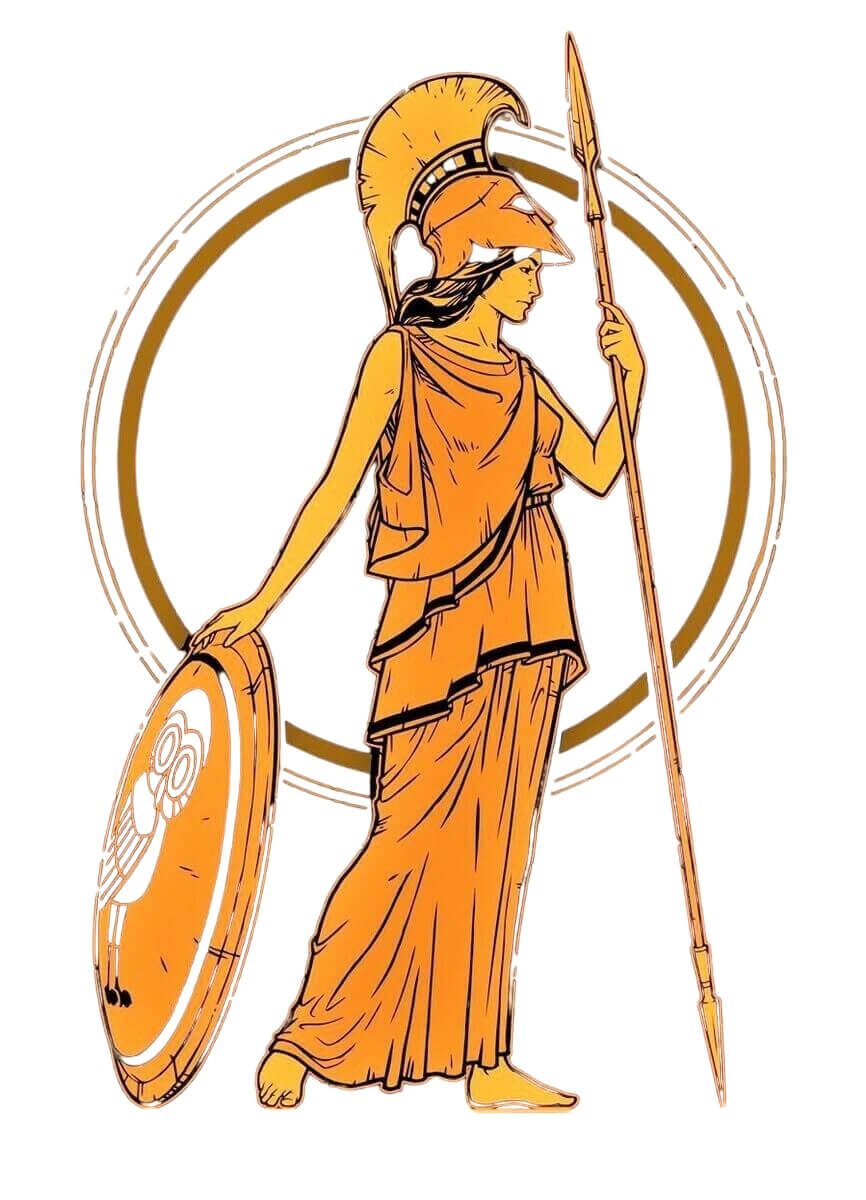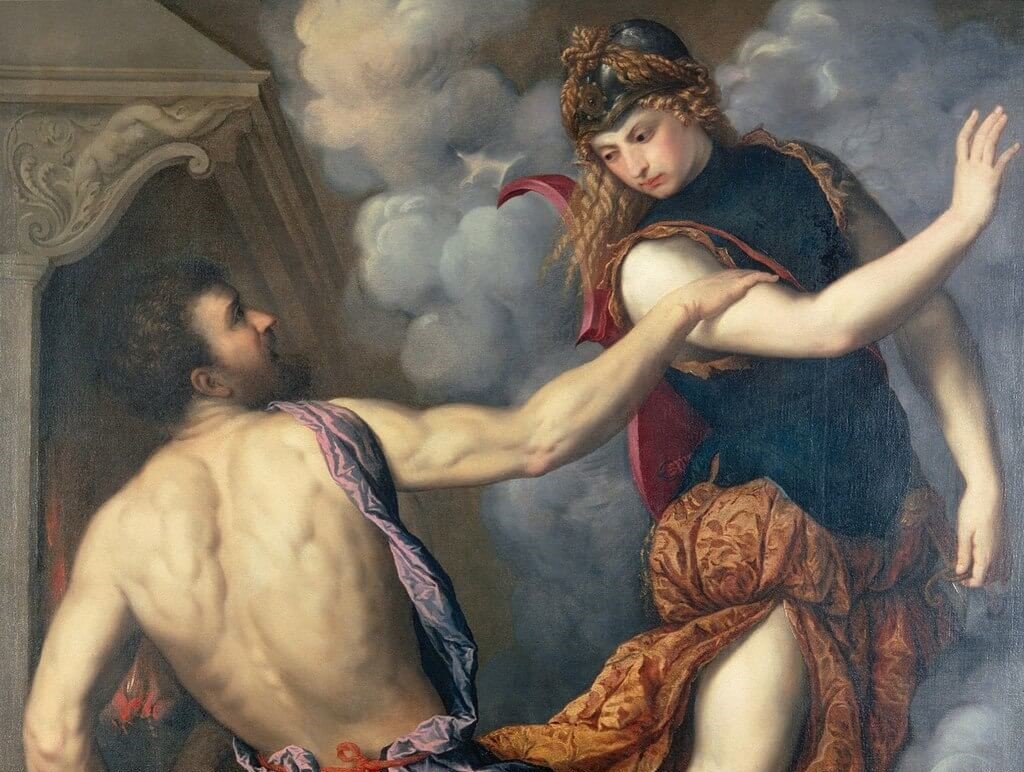
Hephaestus: Greek god of craftsmen, inventors and blacksmiths
In Greek Mythology, Hephaestus is the god of artisans, smiths, carpenters, craftsmen, metalworking and sculpture. He is the ultimate personification of a thinker and inventor for the ancient Greeks. For that reason, he had a failed love affair with Athena, but always adored her as the goddess of wisdom (Science, Art, Philosophy) and had a bad relationship with Hera, whom he managed to fasten to her golden throne, as a revenge for his suffered childhood.
The birth of Hephaestus
According to Homer (Illiad I 571 -577) Hephaestus, was the son of Hera and Zeus. He was born in the palace of bright Olympus. However, he resulted to be different to other gods from the first moment of life. He looked certainly unattractive and had a frail body. Thereupon, Hera became angry because of Hephaestus’s impairment and aesthetic kind. She threw him down from Olympus, craving to exile her recently born child. Thereafter Hephaestus fell down to the sea and broke his leg.
For that reason, in addition to his natural unattractiveness, he also had a limp. The future god of forge and craftsmanship had been floating for a while on the surface of the sea. Nonetheless, the nymphs of the sea had finally rescued and sheltered him. Eurynome, (daughter of the gray-haired elder Oceanus) and Thetis, (daughter of the sea elder Nereus) raised him to manhood.
In the azure grotto, at the bottom of rapturous ocean, the sea nymphs brought up Hephaestus, as if he was their own child. Thereafter, he became a skilled craftsman, able to amaze everyone with his exciting inventions. He created many beautiful vessels, combs, brooches of gold and silver for his saviors. Even the Olympian gods had addressed him with requests and Hephaestus helped everyone, fulfilling their orders.
Hephaestus punishes Hera
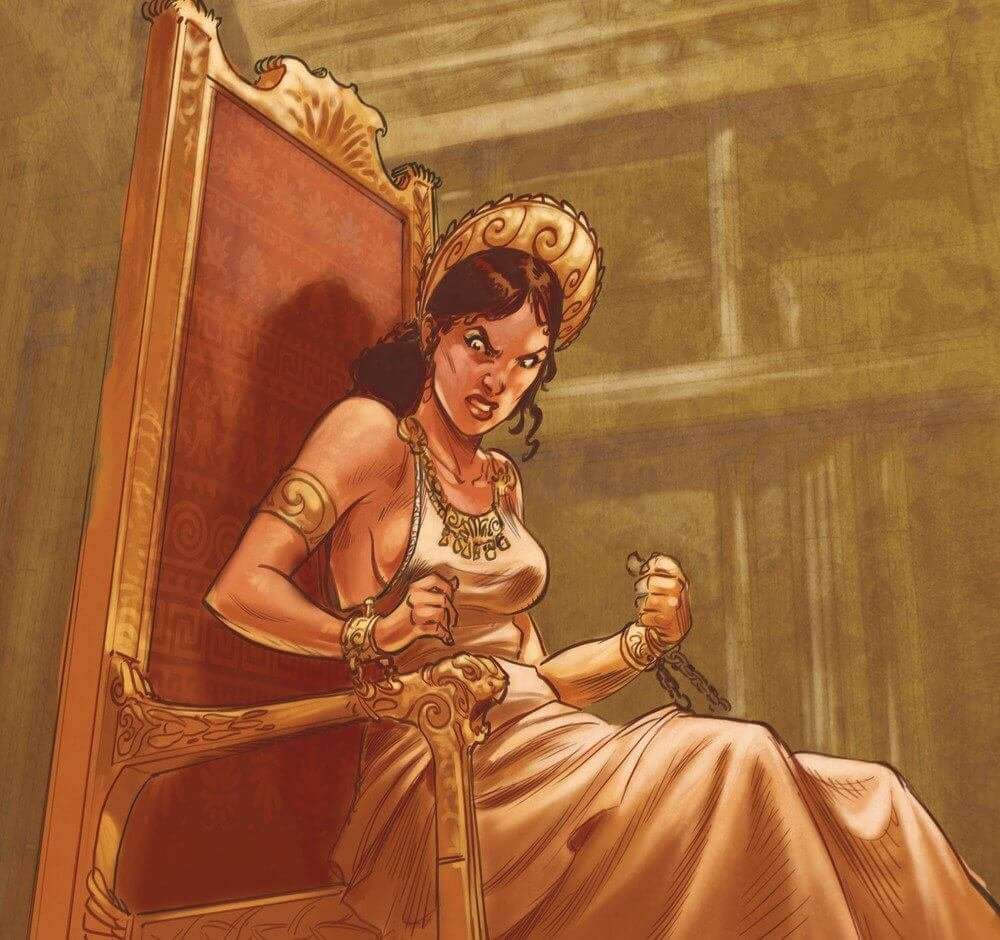
Only Hera never received a gift from Hephaestus. Although one day it seemed to be, that her genius son changed his state of mind from anger to mercy. He sent Hera a marvelous golden throne. The overjoyed goddess immediately sat down on it, thanking Hephaestus for such a present. Nonetheless, immediately afterwards a pair of fetters appeared from the throne and chained her in the most ridiculous way. All the efforts to free Hera resulted to be in vain and the gods of Olympus became incredibly distraught.
In order to solve such a horrible problem they turned to Hephaestus. But he was very awkward and uncooperative. He received the gods with a proud look and responded to their requests with bitter refusal. His mother treated him very unfair when he was a child and he had no desire to help her out. That being so, the great Olympians became despondent and lived in a state of constant unrest, without knowing what to do next. For that reason, Dionysus the god of vine proposed himself as a candidate to persuade Hephaestus.
He went to Hephaestus and offered him to drink for their good acquaintance. The young inventor felt enthusiastically and accepted the offer. After the first cup he continued with the second, the third and the fourth. Shortly afterwards he became gleefully drunk and more cooperative, so Dionysus told him how much had suffered Hera and convinced him to take her fetters away.
Hephaestus returns to Olympus
At this time, Hephaestus became more amiable and satiated with his revenge on Hera. Thus, he agreed to go to Olympus to free his mother. However, the god of smiths got already so drunk and exhilarated, that he couldn’t neither walk, nor stand on his feet. Therefore, Dionysus called his retinue and ordered them to put his guest on a mule.
An instant later, Hephaestus was sitting on a donkey. The satyrs put a wreath of grape leaves on his head, and began to support him from the both sides. At this time and in a noisy Dionysian march, bellowing drunken songs and making uproarious jokes, Hephaestus rode into the main palace of Olympus. Sweet vine and ambrosia did not deprive the great inventor of his skills. Thus, he easily released Hera from her golden throne, and had completely reconciled with her.
Hephaestus and Aphrodite
The wife of the most unattractive god resulted to be the most beautiful goddess, Aphrodite. Hephaestus, who had a malleable character, certainly loved and respected her. However she cheated on him many times and once the god of forge became very upset and angry. Aphrodite had a love affair with the handsome and strong Ares, the powerful god of war. Hephaestus discovered their passionate romance through the god of the sun, Helios. And subsequently had planned an embarrassing trap to humiliate them both.
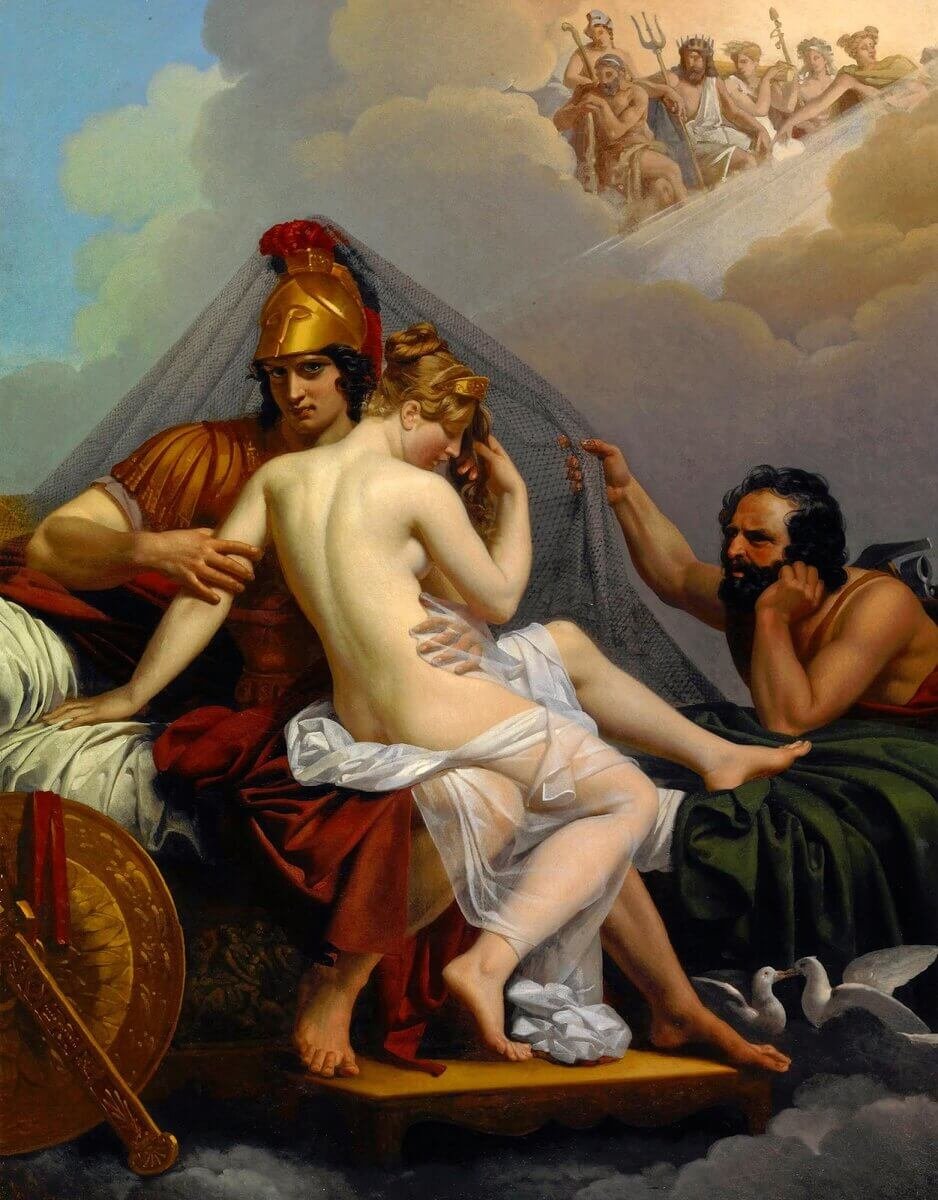
During one of their love encounters he snared them in an unbreakable chain net. It resulted to very thin and light and almost invisible. Shortly afterwards, Hephaestus dragged the net to the Mount Olympus and humiliated Aphrodite and Ares in front of all other gods. The god of forge demanded Zeus the bride price he paid for Aphrodite. In fact, he wanted to dissolve his marriage from this moment on. According to the Odyssey and Iliad Hephaestus didn’t obtain his dowry. However, Poseidon had supported him against Zeus, thus he managed to get divorced and married with the Grace Aglaea.
In this fashion the great inventor avenged his honor and obtained his freedom back. Whether or not, Hephaestus had always spent lots of time in his forges, then amid the ardent passions of his beautiful wife.
The forge of Lemnos
Hephaestus had not just reconciled, but once suffered greatly for his mother. It happened at the time when Zeus had a quarrel with Hera and punished her severely. None of the gods dared to discuss with the king of Olympus and only Hephaestus tried to stand up for his mother. For that reason the Father of immortals threw him off Olympus for the second time. Hephaestus fell to the island of Lemnos and broke his second leg. Therefore, the Greeks called him sometimes as the “Amphigyḗeis”, which means lame on both sides.
Inasmuch as the people of Lemnos treated him well, he was very fond of their island. Here in his honor the Greeks built the city of Hephaestia. And here, under the fire-breathing mountain, Hephaestus established his main forge. He used it, while working together with the Cyclopes who always helped him in his craft.
Hephaestus and the luxury of Olympus
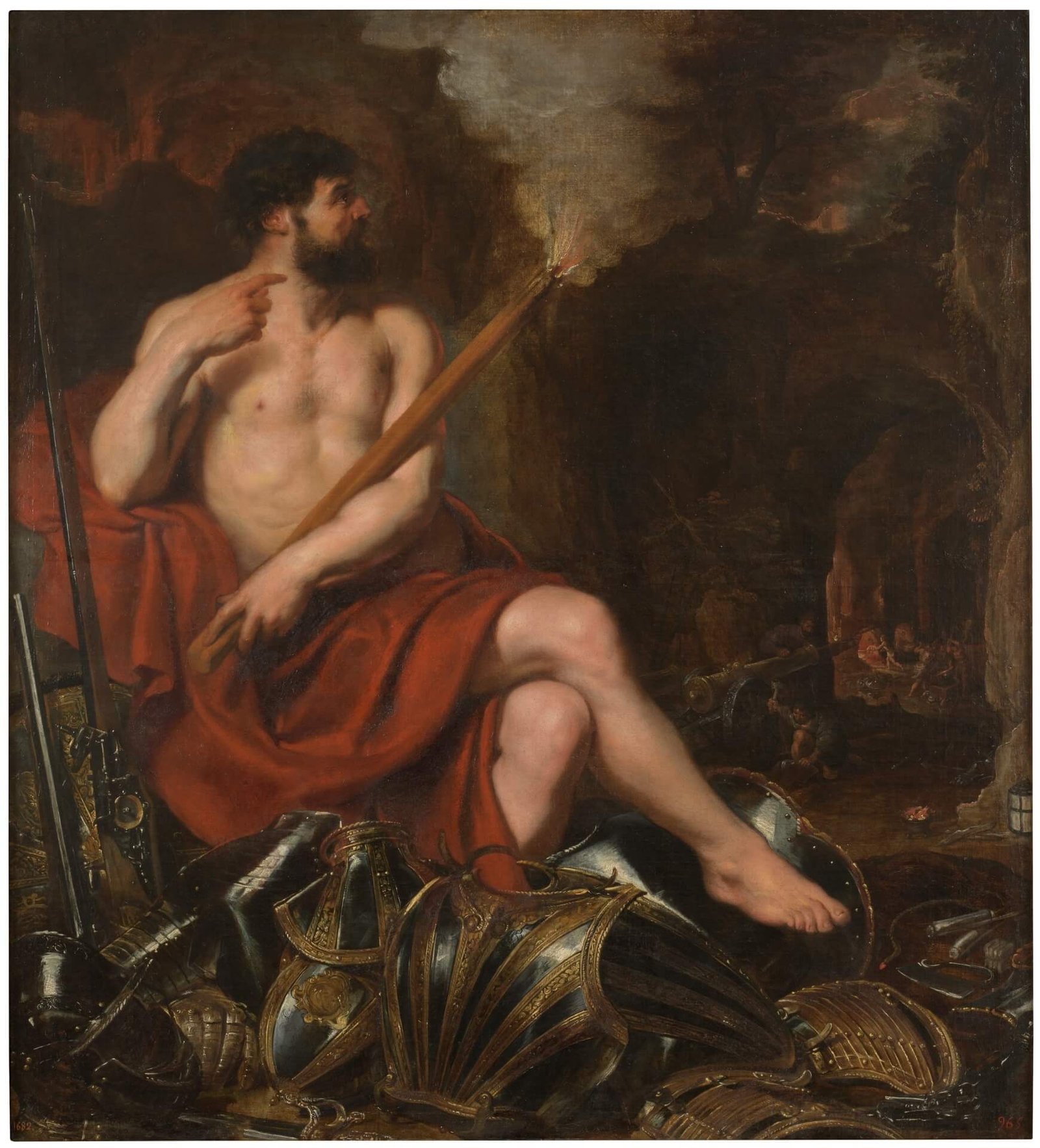
On Olympus Hephaestus had built majestic palaces for all the gods and for himself. Thereafter, in his own mansion he had arranged another incredible forge. Covered with sweat, completely black from dust and soot, he works in it all his free time.
Wonderful things are made in his workshop: indestructible weapons, flawless jewelry of gold and silver, incomparable bowls and cups. Having finished his work and washed himself, the great inventor turns up at the feast of the gods, to see his father, the thunderer Zeus. Hephaestus is friendly and good-natured, and he often manages to stop a quarrel between his parents. When he begins to waddle around the table, pouring nectar into golden goblets, the gods cannot see it without laughter. Impish merriment begins at the feast, and all offenses and misunderstandings are forgotten.
The ingenious automatons
According to The Iliad by Homer, Hephaestus was an amazing great engineer and scientist. He crafted many automatons (self-operated machines), which were able to speak, understand and aid him in his daily work. Some of them were handmaidens of gold, that assisted him in his arduous craftsmanship and filled his day with conversation. Hephaestus also sculpted lions and dogs of gold. He created unwavering animate guardians for the palace of Alcinous and a giant bronze man, named Talos. This colossus circled along the island of Crete three times a day, and was supposed to protect Europa – the newest queen of the island and lover of Zeus.
As it is said in the ancient myths about Prometheus, Hephaestus also proved his great skillfulness and wit as a scientist, creating the first artificial woman, called Pandora. She was supposed to seduce Epimetheus, the brother of Prometheus in order to release the woes and maladies of humanity, as it was planned by Zeus.
Hephaestus and Athena
According to ancient Greek mythology and folklore, Hephaestus always had been a great admirer of Athena, but the goddess of wisdom used to reject him as a wooer, because of her permanent vote of chastity. At one time, Athena had visited the forge of Hephaestus in search of some weapons. Suddenly, the great inventor felt the urge of warmth and intimacy. Thus, he approached the goddess and tried to rape her, but she pushed him aside and managed to flee successfully.
Nonetheless, drops of Hephaestus’s seed fell on the earth and impregnated Gaea. Erichthonius was the product of such an incident. Half-human, half-snake, he had been frequently protected by Athena and by the time he reached his adulthood, he became a great ruler of Athens. Zeus was so much of impressed by Erichthonius and his cleverness, that immediately after his death he raised him to the celestial vault. As a consequence, the constellation of the Charioteer or Auriga had emerged on the sky. Perhaps as a reference to the role of his father Hephaestus as the Babel Tower and Rook of architects, philosophers and engineers in the ancient political system of the Ideal State (in the original Indian chaturanga, the rook has the name of ratha, which means chariot).
Hephaestus meaning in Greek mythology
The god of forge and Hera
The ejection of Hephaestus from Olympus looks like a clear reference to Spartan Eugenics and their selective infanticide policy. However it is the opposite example of negative social mandate and extermination. That is, the weak that kill the strong.
As a matter of fact, the goddess Hera always stood against the rigorous way of warriors, their mighty strength and power of will (she hated Heracles). In addition Hera had always detested the ingenuity and values of the free men. Therefore she symbolized the marriage of convenience, the compendium of legal restrictive rules, iniquitous and unrespectable with natural social hierarchy. To be said, she never considered the amazing qualities of the best men and always distorted their real position in life.
Hera’s marriage with Zeus is full of symbolism: she is the big favoritism for the way of a simple man: only the weak and the mediocre as she and her husband have the right to win and obtain success. Everyone else who is not from the retinue of her fawners must be deprived from his right to live.
That being so, Hera throws Hephaestus out of Olympus, considering him to be unworthy to exist. However he resulted to be the greatest inventor, sculptor, architect and craftsman of all the times. Discriminated by the damned bourgeois society of the time, their laws and traditions Hephaestus had stayed aside in such a way as many great visionaries: Friedrich Nietzsche, Niccoló Machiavelli, Fyodor Dostoevsky, Plato, Socrates, Aristotle, Pythagoras, Nikola Tesla.
The philosophical symbolism of Hephaestus
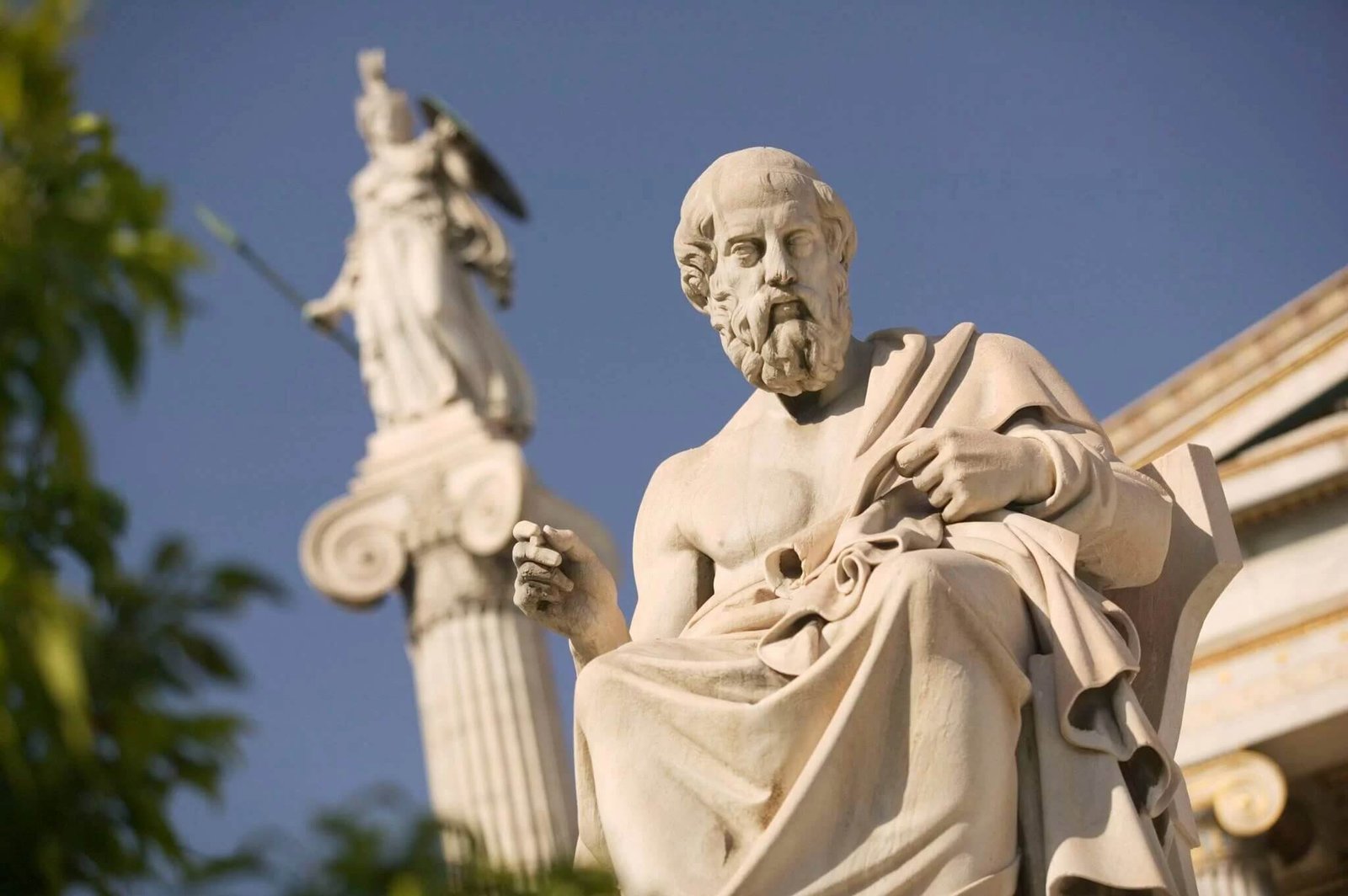
Hephaestus was less attractive but better than many people. Women didn’t like him because of their arrogant and vapid perspective of life. The insipid and unfair legislation, that protected the spiritless kind of thinking had always stayed below his impressive intelligence. For that reason, Hephaestus prevailed over many obstacles and became the great thinker.
He criticized and repudiated the evil falsities of the Ancient Greek social order and managed to chain its anti-human power to the golden throne. The philosopher, the thinker, the visionary, the engineer, the scientist and inventor had trapped the hypocrisy of ancient lawyers and aristocracy. The Ideal State is possible! – exclaimed the thinker. A true philosopher and scientist is able to govern human society much better than the resentful lawyers fond of nihil and envy.
Nonetheless it never happened, due to the compliant character of Hephaestus or his return to Olympus. The aristocrats required the inventions of sages to win the battles and increase their power. Thus, they allowed them to live with certain privileges, but always mantained a rigorous eye upon their deeds.
On the other hand, the thinkers and philosophers of Athens detested the aristocracy, but also disagreed with the Spartan perspective of life, having been hugely underestimated by its military class. Although they did prove, that ingenuity is greatly superior to the Spartan muscles, having predicted the destiny of Sparta in such a way as Hephaestus managed to trap Ares in his net.
Thereupon, the Greek society did not change its leading political features. Hephaestus didn’t smash the power of Zeus and the Spartan Ares did not metamorphose into Poseidon and powerful military democracy. The ideal state of wisdom didn’t destroy the power of injustice. And the indomitable Sparta had never cared about the power of science, philosophy and social integration.
The god-inventor in the life of Ancient Greece
Hephaestus was the god of blacksmiths, carpenters and craftsmen. He patronized metallurgy and architecture, emboding the way of an inventor and ancient engineer. In fact, Hephaestus was a friend of Prometheus, who stole the fire from Olympus and gave it to people.
The great thinker could have built amazing palaces and blooming gardens, for all the citizens of Hellas. He could have invented the first airplane, the first electric motor vehicle, the submarine and the train. Hephaestus could have been a much better lawyer than Hera, establishing the first democratic laws amid the ancient Greek poleis.
He could have contributed to the early progress of humankind and the expansion of Ancient Greece, as the first Ideal State. His name was Aristotle and Archimedes, Ctesibius and Theodorus of Samos, Thales of Miletus, Socrates, Pythagoras and Plato. However, Hephaestus failed as a revolutionary and social-utopian, because he always had been alone. He was surrounded by people, who never would support his rebellion against the malevolent power of ancient aristocracy and their despicable and useless perspective of life.
In the meantime, Hephaestus tried to possess the power of science and its eternal beauty, but the awesome Athena, escaped his pretensions of rapturous life. In fact, the man just had begun to discover the amazing secrets of science and never tried to dethrone the tyranny of Zeus.
